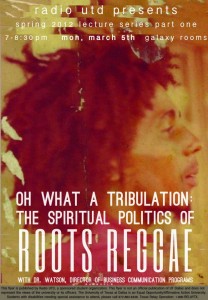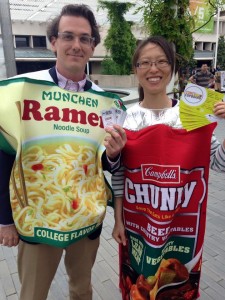Because engagement is an essential prerequisite for learning, finding ways to ignite students’ desire to engage is a key part of any teacher’s job. There are many ways to accomplish this but I will describe two that are most central to my teaching practice.
But first I’d like to briefly sketch bit of background so that it is clear how my teaching interacts with – and often pushes against – the thinking/attitude of students when they come in to one of my courses.
Most students enter my courses greatly underestimating the value of so-called ‘soft skills’ like writing, listening, speaking, and collaboration. This is because most of their other business courses are either technical/quantitative (ie formulas, Excel work, etc.) or purely academic (ie conceptual/theoretical) in nature and students are assessed in a ‘right/wrong’ manner on Scantron exams. These sorts of learning, in which there is ‘1 right answer’ and a person’s primary job is to find it, are important but over time lead students to think that the world outside of the university operates on a ‘1 right answer’ basis in which there is little room for ambiguity, uncertainty, or difference of opinion. Sure, they say, being able to write clearly, speak well, and get along with others is useful, but that is only marginally important for me in my work in my career. Getting students to unlearn this attitude and engaged in developing their ‘whole-self potential’ is one of the great challenges and joys of my job.
1. Emphasize professional development, warm competence, and ‘whole self’ job readiness
I generate student engagement primarily by having students develop skills and attitudes that, while done within the context of a college course, are intended for use outside of their life and mindset as students. In the vast majority of university courses, no one outside the instructor ever sees, can learn from, or even knows the existence of a student’s work. Their work is always done ‘for a class’ and over time students learn that work that is ‘for a class’ is pretty pointless for anything other than getting a grade. Because my courses require students to not only develop their skills and confidence as professional communicators but to SHOW that work to others and to the world, students come to see what they are doing as not ‘for a class’ but as ‘for them and their future.’
Two key projects where this is done are the Informational Interview and the Professional Online Portfolio (POP) projects. Students are pushed out into the world outside of the classroom and given a chance to meet real people, ask questions, listen, and talk about themselves in a professional context. Students then reflect on that experience, identify what went well, what they could improve on, and in that way end up with stronger communication skills and more personal confidence than they had before. This kind of active learning – within but not solely for my class – engages students in a way unlike what they are used to and re-energizes them for the challenges they will face when they – very shortly – stop being students.
2. Create field experiences, competitions, and social interaction opportunities
Because I think my primary responsibility as an educator is to help students develop the skills and attitudes necessary for success after they stop being students, getting them out of the classroom and into the community is central to my teaching  practice. I do this in/through classroom means, particularly via the ‘Business Gives Back’ Business Communication Competition that I organize every semester. This competition, which takes place throughout the semester and culminates in an evening, auditorium-filling final event with corporate leaders as judges, creates an incentive for over 650 students in BCOM3310: Business Communication to push themselves to greater and more mature work on the key project of the course. The project tasks
practice. I do this in/through classroom means, particularly via the ‘Business Gives Back’ Business Communication Competition that I organize every semester. This competition, which takes place throughout the semester and culminates in an evening, auditorium-filling final event with corporate leaders as judges, creates an incentive for over 650 students in BCOM3310: Business Communication to push themselves to greater and more mature work on the key project of the course. The project tasks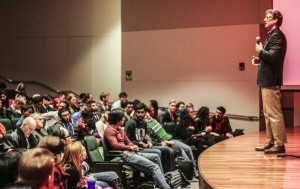 students with creating a community action project through which local corporations can make a positive difference in the community. Students enjoy identifying, learning about, and making a difference for local people facing challenges like homelessness, child hunger, and veteran unemployment. Although their projects are initially hypothetical, several student projects are being considered by local firms for implementation.
students with creating a community action project through which local corporations can make a positive difference in the community. Students enjoy identifying, learning about, and making a difference for local people facing challenges like homelessness, child hunger, and veteran unemployment. Although their projects are initially hypothetical, several student projects are being considered by local firms for implementation.
I also create occasions for learning and engagement outside the classroom through my work as faculty advisor to undergraduate student organizations. The three most active student organizations I advise are ALPFA (The Association of Latino Students in Finance and Accounting) (75 members), TEDxUTD (60 members), and Alif Laam Meem (50 members).
ALPFA – In Spring 2015, I worked with an alumni leader in the foreign currency exchange desk at JP Morgan Chase to create a series of field opportunities for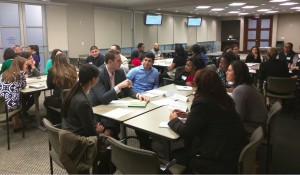 ALPFA members to interact with JPMC employees, learn more about day-to-day business communication challenges, and enhance their situated networking and relationship skills. I wrote about this experience as a model for effective alumni-faculty collaboration the JSOM Perspectives blog.
ALPFA members to interact with JPMC employees, learn more about day-to-day business communication challenges, and enhance their situated networking and relationship skills. I wrote about this experience as a model for effective alumni-faculty collaboration the JSOM Perspectives blog.
TEDxUTD – Unlike most university-based TEDx groups, TEDxUTD completely student-run with my role being primarily as a consultant who helps them think through programming choices and assists with event management annoyances. I am extremely proud of the group because they have managed to  put on several very impressive TEDx conferences with local – and student – speakers who are doing innovative things to address important social, technological, and educational problems. Their work has been so impressive that we are in talks with the university to receive funding and space prioritization for our Spring 2016 conference, which is a testament to what the students have been able to do thus far on a shoestring budget.
put on several very impressive TEDx conferences with local – and student – speakers who are doing innovative things to address important social, technological, and educational problems. Their work has been so impressive that we are in talks with the university to receive funding and space prioritization for our Spring 2016 conference, which is a testament to what the students have been able to do thus far on a shoestring budget.
Alif Laam Meem – Finally, it has been my pleasure and honor to be the founding faculty advisor for the fraternity Alpha Lambda Mu. I taught several of the 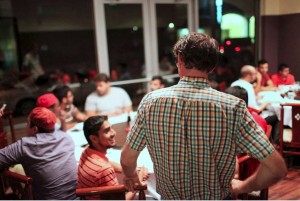 brothers in 2011 when they were beginning to discuss starting a new fraternity and they asked me to be their advisor. Who could have imagined that those initial interactions would lead me and the brothers to the front page of the New
brothers in 2011 when they were beginning to discuss starting a new fraternity and they asked me to be their advisor. Who could have imagined that those initial interactions would lead me and the brothers to the front page of the New 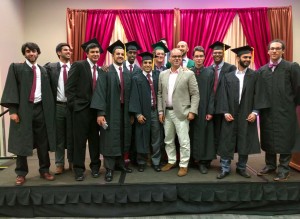 York Times, interviews with dozens of news outlets, new chapters of the fraternity around the country, and a feature documentary? This has been a learning experience for all involved and, though not without challenge, has been one of the most rewarding experiences I’ve had as both a teacher and a person.
York Times, interviews with dozens of news outlets, new chapters of the fraternity around the country, and a feature documentary? This has been a learning experience for all involved and, though not without challenge, has been one of the most rewarding experiences I’ve had as both a teacher and a person.
Outside of these official roles, I really enjoy the informal ways I can teach and lead and enrich the undergraduate experience. These may be giving a music lecture on one of my passions:
Spending time at the Plinth raising awareness about UTD’s Comet Cupboard, a student-run and student-serving food bank:
Or getting EXTREMELY wet at the dunk booth for Welcome Week:
In closing, my overarching goal as an educator is to make a positive difference for students and help them get where they want to go. This entails attention and care to what happens in the classroom first and foremost but also to what happens in my office, in the food court, in the conference room, and in the community. It is both a pleasure and a privilege to be able to engage at all these levels in my work at UT-Dallas.
